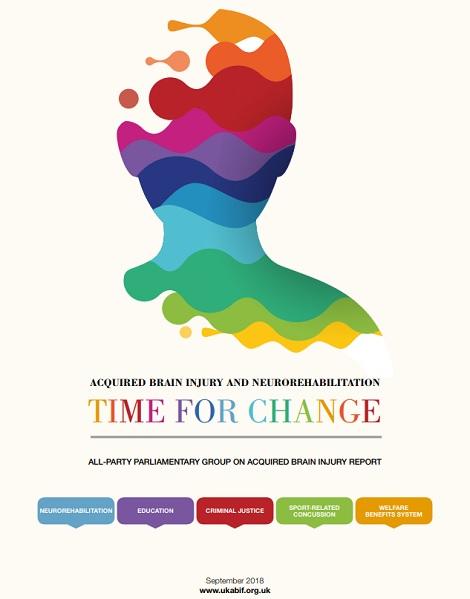Chris Bryant, Labour MP for Rhondda, told Parliament of the need to invest time in acquired brain injury. He said: “We can save lives, we can give people better quality of life, but we can only do it if we join the dots.”
He stated: “On average every single primary school class in this country will have at least one child who has a brain injury in it, sometimes unaware. The good news is, that if we get good rehabilitation we could actually save the NHS £5 billion a year.”
The 40-page Time for Change report:
- outlines the critical role of neurorehabilitation in the ABI care pathway, and the need for Rehabilitation Prescriptions for all brain injury survivors following discharge from acute care;
- reviews the implications for children and young people with ABI when most of their neurorehabilitation takes place in the education system;
- discusses the high incidence of ABI amongst offenders and the impact of neurorehabilitation on behavioural change and reoffending; and
- outlines the current issues in sport-related concussion as well as the need for an improved welfare system that is easily accessible.
Children and young people with ABI in education
The report covers education in-depth with the executive summary stating: “There are many children and young people with ABI in education, with varying needs and unknown long-term trajectories. They have a wide range of difficulties that can change over time and impact on their learning ability. Many require bespoke management, regular monitoring and review for the duration of their education.”
The Education chapter includes an overview; explains the long-term consequences for learning; the need for support in education; and a case study.
Key issues and recommendations for education are outlined below.
Education: key issues
- There is a lack of awareness and understanding amongst education professionals about Acquired Brain Injury, its consequences and its impact on learning.
- Education professionals have difficulty identifying what specific educational support is needed following Acquired Brain Injury, in terms of assessment tools, learning strategies and interventions.
- There is a lack of liaison, including information sharing regarding assessment and support, between health and education professionals, as well as a lack of involvement and communication with the family.
Education: recommendations
- Acquired Brain Injury should be included in the Special Educational Needs and Disability Code of Practice.
- All education professionals should have a minimum level of awareness and understanding about Acquired Brain Injury and the educational requirements of children and young people with this condition (i.e. completion of a short online course for all school-based staff). Additional training should be provided for the named lead professional who supports the individual with Acquired Brain Injury, and for Special Educational Needs Coordinators.
- The Acquired Brain Injury Card for the under 18s (produced by the Child Brain Injury Trust) should be promoted in all schools, hospitals and Local Education Authorities.
- Many children and young people with Acquired Brain Injury require individually-tailored, collaborative and integrated support for the return to school, and throughout their education. An agreed ‘return-to-school’ pathway plan is required, led and monitored by a named lead professional, to provide a consistent approach and support for the individual, their family and teachers.

